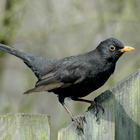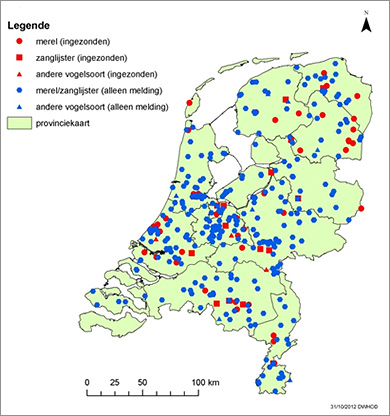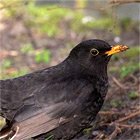Blackbirds and Usutu-virus
18 December 2012
Usutu-virus not found in Dutch blackbirds

Photo: Ruud van Beusekom
Vogelbescherming Nederland
Usutu-virus has not been found in blackbirds (Turdus merula) and song thrushes (Turdus philomelos) in the Netherlands after extensive post-mortem investigations.
Concerns were raised that this virus may have passed into the Netherlands from Germany where it has caused the death of large numbers of blackbirds. Despite these findings, researchers have warned that the virus could appear in the Netherlands next year with the onset of the mosquito season. After media stories in October about the threat of Usutu-virus associated blackbird die-offs occurring in the Netherlands large numbers of dead birds were reported to the Dutch Bird Protection Society, the Dutch Field Ornithology Center (Sovon) and the Dutch Wildlife Health Centre (DWHC). Seventy birds (predominantly blackbirds with fewer thrushes and some other wild bird species) were submitted to the DWHC for post-mortem investigation. Tissue samples taken during the post-mortem were sent to the Dutch National Institute for Public Health and the Environment (RIVM) for further testing; all samples were negative for Usutu-virus.
Warning over 2013
Usutu-virus is transmitted by mosquitoes and researchers have warned that Usutu-virus could make an appearance in the Netherlands with the onset of the next mosquito season.
To-date submissions have been received from across the country, demonstrating the public interest in this threat to this popular garden bird species. In order to support the continued monitoring of blackbirds (and other wild bird species) in the Netherlands for Usutu-virus members of the public are encourage to report unusual deaths or deaths of large numbers of blackbirds via the submission form on the DWHC website.
For more information, please contact Marieke Veldman, in the Communication Department at the University of Utrecht Veterinary School on (030) 253 3430.
16 November 2012
In October 2012 the DWHC received upwards of 400 reports of dead or sick songbirds, the majority being blackbirds. This high rate of reporting is believed to be the result of media attention for the blackbird die-offs in Germany that have been attributed to Usutu-virus. Common to many of the reports was that the birds appeared to be in good condition with no external signs of illness or injury.

Locations of dead birds reported (blue) or submitted (red) the DWHC in October 2012. Circles and squares refer to blackbirds and thrushes, respectively and triangles represent other songbird species.
Both the Dutch Bird Protection Society, the Dutch Field Ornithology Center (Sovon) also received large numbers of reports of dead birds in this period.
The majority of the 70 birds submitted to the DWHC for post-mortem investigation were blackbirds, with fewer song thrushes and a single other songbird. Results of these investigations were not suggestive of Usutu-virus infection; further testing is being carried out at the Dutch National Institute for Public Health and the Environment.

Photo: Luc Hoogestein
9 October 2012
Usutu-virus, a flavivirus, was first detected in Europe in the late summer of 2001 in blackbirds (Turdus merula) in Austria (1) and has since been found in Hungary, Italy, Switzerland, and most recently in Germany. In the summer of 2009 two immune compromised people in Italy developed symptoms associated with Usutu-virus infection (2). In 2012 researchers at the Bernard Nocht Institute in Hamburg detected Usutu-virus (with PCR) in dead blackbirds from Baden-Würtemberg , Rheinland-Pfalz (where it was also seen in 2011) and North Rhine Westaphalia. The virus was also found in Culex pipiens pipiens mosquitos caught in Baden-Würtemberg (2). In addition, antibodies to Usutu-virus were found in one of 4200 human blood donations, indicating that the individual had come into contact with the virus – although in this case no illness was reported (3). In these European outbreaks Usutu-virus infection was detected in blackbirds and other songbirds including the house sparrow (Passer domesticus) (4, 5).
Referenties
- Emergence of Usutu virus, an African mosquito-borne flavivirus of the Japanese encephalitis virus group, central Europe.Weissenböck H, Kolodziejek J, Url A, Lussy H, Rebel-Bauder B, Nowotny N. Emerg Infect Dis. 2002 Jul;8(7):652-6.
- Isolation of Usutu virus in Germany.Jöst H, Bialonski A, Maus D, Sambri V, Eiden M, Groschup MH, Günther S, Becker N, Schmidt-Chanasit J.Am J Trop Med Hyg. 2011 Sep;85(3):551-3
- www.promedmail.org
- Emergence and establishment of Usutu virus infection in wild and captive avian species in and around Zurich, Switzerland-Genomic and pathologic comparison to other central European outbreaks. Steinmetz HW, Bakonyi T, Weissenbrock H, Hatt J-M, Eulenerger U, Robert N, Hoop R, Nowotny N. Vet Microbiology 2011, 148, 207-212
- Epizootic Emergence of Usutu virus in wild and captive birds in Germany. Becker N, Jöst H, Ziegler U, Eiden M, Höper D, Emmerich P et al. Plos One, 2012, 7 (2) e32604



